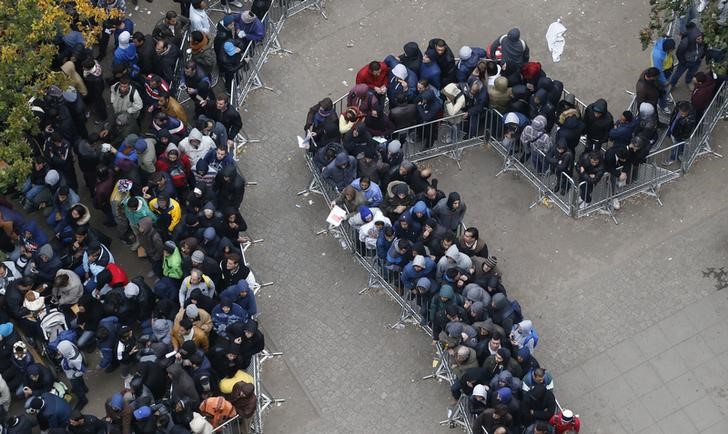BERLIN/BRUSSELS/LIMA (Reuters) - German and EU officials on Saturday denied a media report that Berlin and Brussels were in informal talks about a type of European solidarity tax to help cover the costs of stemming a record-breaking influx of asylum seekers.
"The fact remains: we don't want tax increases in Germany or to introduce an EU tax," government spokesman Steffen Seibert said in a statement.
A spokesman for the European Commission also dismissed the report. "There is no such proposal currently on the table or under preparation," he said, adding the Commission never comments on rumours in the press.
Earlier, the Sueddeutsche Zeitung had reported the German government and European Commision were mulling a levy that could be raised through a surcharge on petroleum tax or by increasing Value Added Tax (VAT).
The Munich paper said additional funds from a solidarity tax would be used to help EU member states, such as Spain, Italy, Greece and Bulgaria, secure their borders, as well as to help improve living condition in the home countries of asylum seekers to encourage their citizens to remain there.
The Sueddeutsche's report cited no sources, and was datelined Lima, Peru, where Finance Minister Wolfgang Schaeuble was attending an International Monetary Fund meeting.
In Lima, asked by reporters about the European solidarity tax idea, Schaeuble replied: "It is a question for the European Commission, and therefore I feel I should limit myself to what I have already said: 'I think the management of this task (handling the refugee influx) has the highest priority'."
He added: "In Germany we have fiscal space ... others in Europe probably don't have so much, and nonetheless the problem must be solved."
French Finance Minister Michel Sapin, also speaking in Lima, said Europe needed to mobilise all its existing financial resources before thinking about new funding measures.
"The idea of a tax specifically marked towards welcoming refugees or financing actions to keep refugees near their country of origin, seems to be an idea that risks exacerbating negative reactions among certain parts of the European population," Sapin told reporters.
Last month German Chancellor Angela Merkel said the country, which is Europe's biggest recipient of asylum seekers, could handle the surge in new arrivals without raising taxes or jeopardising its balanced budget. But worries about the influx have cut into the popularity of her conservatives.
More than half a million people fleeing war and poverty in the Middle East and Africa have poured into the European Union this year, prompting bitter disputes over how to react and share out responsibility and costs.

The European Commission has said EU states, whose budgets risk being stretched by the crisis, might get budget relief.